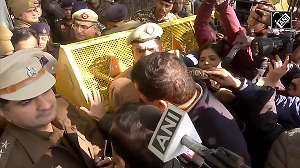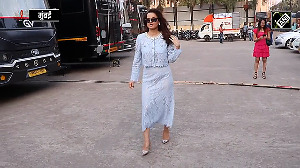 Buying a new car makes sense as a tempting discount on an old car may cost you dear later.
Buying a new car makes sense as a tempting discount on an old car may cost you dear later.The price of an old car versus that of a brand new one always tilts the scales in favour of the former.
However, it is the only time when you will really save some money. Otherwise, maintenance of used cars is not cheap.
Neither is getting finance. You end up paying 50 per cent more than you would for a new car.
And, we are still not talking of situations where the company has discontinued the model you picked.
Twenty six-year-old techie, Yogesh Tiwari, thought he got a good deal when he purchased a used Tata Indica diesel from a well-known car dealer in Mumbai.
He paid only Rs 150,000 for the car, which is 35 per cent the price of a new car.
The doors seemed to have a slight problem, but his mechanic had approved.
Nine months later, the door at the driver's side came off, while he was driving on the highway.
"I could have lost my life. I am ready to compromise on features if I want to cut down on expenses, but will opt for a new car," says Tiwari.
he biggest risk of buying a used car is that it comes loaded with uncertainties be it mechanical, electrical or even a minor problem with the vehicle's body.
Sellers are sure to have touched up cars with a good paint and minor repairs, before putting them up for sale. It makes a clear evaluation of the car difficult.
People overlook small faults, thinking every used car would have these. "But these minor faults later need expensive repairs," says Sanjay Kadekar, GM at Sai Service, a corporate used car provider.
When Mudassir Shaikh, a retail chain employee, purchased a used Maruti Esteem, both he and his mechanic failed to notice a leak.
The leakage, it turned out, affected one of the fluids controlling the car's temperature. He spent Rs 5,000 on changing the car's radiator days after the purchase.
As Kadekar adds, "With a high number of new models being launched, even trained mechanics find it difficult to pinpoint flaws, especially the electrical ones."
Looking at the car's service history can give an idea of its maintenance by the earlier user.
But, there's a catch even here.
Most owners save costs by getting their cars repaired at the local mechanic rather than at the company showroom once the free service period is over.
Opt for recent cars as replacing spare parts of older cars that have gone through higher
Also, the older the car the higher the chances of the model being discontinued.
Even if the spares for such models are available, buyers will have to shell out a higher price for these rarities.
Put your money on the table only if you are sure of the validity of the car's papers.
Ask for the original bill, service history and the car's insurance papers, especially if you are buying through a local dealer who insists on cash payments.
You cannot claim depreciation on the vehicle without these, if you are going to show it as part of your company's expenses.
Buyers who purchase cars registered outside their state face problems with octroi duties. In such cases, the burden of paying the state duties rests with them.
If you are looking for finance for a used car, lenders will charge a higher interest rate.
For instance, HDFC Bank charges 7.50-15.50 per cent interest for a new car based on the tenor and segment of the vehicle. For a similar used car, its rates are between 11-24 per cent.
This would mean a steep hike in repayments. Even at the highest interest rate of 15.5 per cent for a new car, a Rs 300,000-loan taken for five years would have the person paying Rs 1.33 lakh as interest.
For a used car, the same loan would be availed at an interest rate of 24 per cent and the borrower will need to shell out Rs 218,000.
The alternative is to go for corporate used car companies promoted by most manufacturers. Mahindra and Mahindra sells used car through First Choice. Maruti Suzuki has True Value showrooms.
These corporate dealers certify the vehicles they sell, after 100-odd checks. Some may even give a warranty for a year.
However, the buyer needs to shell out much higher value for such cars.
Cars up to two years old are sold at a 25-30 per cent discount to the original price of the car.
At one of the organised dealers, for example, a 2009 Honda City S model was available at Rs 850,000.
The original cost for a brand new car is around Rs 10.5 lakh (Rs 1.05 million).
At just a difference of 20 per cent, a discerning buyer would obviously go for a new car instead of a two-year-old car.












 © 2025 Rediff.com -
© 2025 Rediff.com -